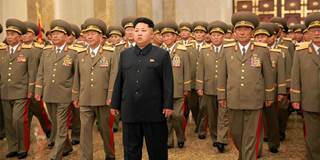It is easy to understand why many analysts have begun to focus on what North Korea’s demise might mean for political arrangements on the Korean Peninsula. At some point, and in some as-yet-undefined way, the People's Democratic Republic will be unable to function, and the Republic of Korea will become the successor state.
DENVER – Negotiators from the two Koreas appear to have resolved this month’s crisis, in which South Korea’s use of loudspeakers to broadcast messages across the demilitarized zone spurred threats of war from the North. That is welcome news for the region and the world: Amid growing fears about the Chinese economy, there are already plenty of reasons to worry about events in Northeast Asia. Nonetheless, the underlying uncertainty regarding North Korea’s future under Kim Jong-un remains, and the latest episode provides an important opportunity to evaluate his leadership.
Kim’s behavior was much in keeping with that of his father, Kim Jong-il, and grandfather, Kim Il-sung: Create a crisis for no apparent reason and expect a reward for ending it. But, in the latest crisis, Kim gained little. North Korea received no new food deals, no economic or financial assistance, no help with energy or agriculture, and no warm words from the Chinese. Indeed, it is difficult to see why Kim started this crisis in the first place.
What Kim does seem to have received is South Korea’s agreement to stop the broadcasts, which included some very telling personal criticism of him. And that may have been enough.

DENVER – Negotiators from the two Koreas appear to have resolved this month’s crisis, in which South Korea’s use of loudspeakers to broadcast messages across the demilitarized zone spurred threats of war from the North. That is welcome news for the region and the world: Amid growing fears about the Chinese economy, there are already plenty of reasons to worry about events in Northeast Asia. Nonetheless, the underlying uncertainty regarding North Korea’s future under Kim Jong-un remains, and the latest episode provides an important opportunity to evaluate his leadership.
Kim’s behavior was much in keeping with that of his father, Kim Jong-il, and grandfather, Kim Il-sung: Create a crisis for no apparent reason and expect a reward for ending it. But, in the latest crisis, Kim gained little. North Korea received no new food deals, no economic or financial assistance, no help with energy or agriculture, and no warm words from the Chinese. Indeed, it is difficult to see why Kim started this crisis in the first place.
What Kim does seem to have received is South Korea’s agreement to stop the broadcasts, which included some very telling personal criticism of him. And that may have been enough.